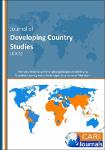The role of Non-Governmental organisations in enhancing household poverty reduction in Uganda: a review of literature
Abstract
Purpose: The purpose of this study was to discuss the contribution of Non-Governmental Organisations in enhancing poverty reduction among households in Uganda by looking at the relationship between NGO Activities and poverty reduction in Uganda as well as the contribution of NGO activities and poverty reduction in Uganda.
Methodology: The study adopted a literature review of available data on Uganda, the region and other parts of the world regarding the link between Non-governmental organisations and household poverty reduction. The sources consulted include academic manuscripts, journals, peer-reviewed books, policy documents, annual reports as well as statistical papers.
Findings: Results suggest a positive relationship between microfinance and poverty while most studies confirm that microfinance has a potential outcome on reducing poverty. More, results indicate NGOs’ support to food security and household poverty reduction as well as complex community perception of NGOs activities in poverty reduction, promotion of education and training, health, environmental conservation, and protection against child abuse.
Conclusion and recommendations: NGOs might be doing a wonderful service to community members in various countries in the name of poverty reduction, not much of their achievements have been documented. It was even more paramount that, Uganda, with many NGOs working along poverty reduction strategies have their achievements studied, documented and widely shared. Thus, the government provides a more conducive working environment for the NGOs to be able to function and operate with less fear from the censorship of state organs; and, an amicable working relationship be forged between government and the NGOs given that the two are partners in community development.
Unique contribution to policy and/or practice: This review on the contribution of NGOs to household poverty reduction is essential to national and local policy makers on facilitating the stakeholders to appreciate the fundamental role played by non-state actors in community transformation.
Collections
- Research Articles [143]

